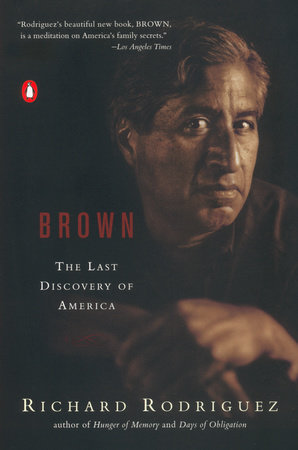Postracial Mestizaje: Richard Rodriguez’s Racial Imagination in an America Where Everyone Is Beginning to Melt
American Studies
Volume 54, Number 1, 2015
pages 89-113
DOI: 10.1353/ams.2015.0007
Lee Bebout, Associate Professor of English
Arizona State University
And it seemed to me that the larger questions about America that the color raised is the fact that we are, all of us, in our various colors, our various hues, melting into each other and creating a brown nation. I tried to write a brown book, that is, brownly, by engaging contradiction and paradox, and rhetorical devices that suggest the way that I experience my own life. That is, for example, as the descendent of a conquistador and the Indian—as a Hispanic.
Richard Rodriguez
In recent years, racial formation in the United States has thrived in precipitous tension. Since the social and political tumult of the various freedom struggles from the 1950s to the 1970s and the rise of multiculturalism, explicitly racist discourses and practices have fallen from favor. Yet as many have noted, the material saliency of race is felt as much as ever. Thus, we are left with a wide array of seeming contradictions that maintain white supremacy and other forms of inequality in the guise of fairness and the protection of rights: ever-rising incarceration rates in communities of color through mandatory sentencing and policies of disparate impact, delegitimization campaigns against the first African American President of the United States through questions of his birthright citizenship, anti-(Latino) immigration policies that respond to the Hispanicization of America that mark people under “reasonable suspicion” of foreignness, and the targeting and banning of Mexican American Studies curricula by calling for students to be treated as individuals. These are but a few examples of the dynamic tension of racial formation in contemporary U.S. culture. It is within this context that I seek to situate Richard Rodriguez’s exploration of race in America in his 2002 book Brown: The Last Discovery of America.
Responding in part to Huntingtonian fears of a “clash of civilizations” and a “browning of America,” Rodriguez exalts the impurity of brown as a great American tradition. For Rodriguez, it is not “Brown, … in the sense of pigment, necessarily, but brown because mixed, confused, lumped impure, unpasteurized, as motives are mixed, and the fluids of generations are mixed and emotions are unclear, and the tally of human progress and failure in every generation is mixed, and unaccounted for, missing in plain sight.”
Here one may find common ground between Rodriguez’s “brown” and theorizations of complex personhood by Gloria Anzaldúa and Avery Gordon. Each maps the interactions of multiple, contradictory elements that constitute any individual. For Anzaldúa, this means embracing rejected aspects of the self: the working class, the indigenous, and the queer. In complementary fashion, Gordon suggests that people are not so easily compartmentalized as either victims or agents of their own destiny. Together, they articulate the impurity that Rodriguez terms brown. As this article will demonstrate, however, even as Rodriguez seeks to contest notions of purity, racial and otherwise, Brown serves the interests of the dominant racial order vis-à-vis its relationship to neoliberal thought and discursive strategies. Through Brown, Rodriguez advances a post-racial mestizaje, an embrace of mixture and contradiction that seeks to subvert the social construct of race and yet simultaneously acquiesces to the logics that undergird current inequalities.
In a Brown Context
The political thrust of Rodriguez’s brown project takes on greater significance when placed in context with his earlier work and its critical response. A child of Mexican immigrants who came of age during the Chicano movement—although certainly not a part of it—Rodriguez is one of the most recognized Latina/o public intellectuals today. Yet his vocal arguments against bilingual education, ethnic studies, and affirmative action have long made him a target of criticism. With the publication of his first memoir, Hunger of Memory, and his speaking engagements in conservative circles, Rodriguez advanced a problematic argument of a split between private and public selves. For Rodriguez, his Mexican heritage and the Spanish language were relegated to the private, familial sphere. Because of this argument, Rodriguez became a veritable Hispanic, anti-Chicano boogieman. Tomás Rivera, Ramón Saldívar, William Nericcio, and others critiqued Rodriguez’s thinking, and sometimes Rodriguez himself, as the result of a colonized mind, blind to history and structural…

